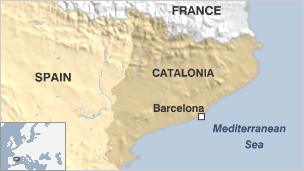Europe
Catalonia profile - Overview
- 15 January 2015
- Europe

Proud of its own identity and language, Catalonia is one of Spain's richest and most highly industrialised regions, and also one of the most independent-minded.
With a distinct history stretching back to the early middle ages, many Catalans think of themselves as a separate nation from the rest of Spain.
This feeling is fed by memories of the Franco dictatorship, which attempted to suppress Catalan identity, and is nowhere more clearly expressed than in the fierce rivalry between FC Barcelona and Real Madrid, Spain's top football clubs.
A roughly triangular region in Spain's far north-east corner, Catalonia is separated by the Pyrenean mountains from southern France, with which it has close historical ties.
Most of the region's population lives in Barcelona, its vibrant political and economic hub and a popular European travel destination.
Holiday-makers also flock to the Mediterranean beaches of the Costa Brava and Costa Daurada/Dorada, and the Pyrenees are popular with hikers, making tourism an important part of Catalonia's economy.
But it is manufacturing - traditionally textiles, but more recently overtaken in importance by the chemical industry, food-processing, metalworking - that make the region Spain's economic powerhouse, along with a growing service sector.
History
The area first emerged as a distinct entity with the rise of the County of Barcelona to pre-eminence in the 11th century. In the 12th century, the county was brought under the same royal rule as the neighbouring kingdom of Aragon, going on to become a major medieval sea power.
Catalonia has been part of Spain since its genesis in the 15th century, when King Ferdinand of Aragon and Queen Isabella of Castile married and united their realms.
Initially retaining its own institutions, the region was ever more tightly integrated into the Spanish state, until the 19th century ushered in a renewed sense of Catalan identity, which flowed into a campaign for political autonomy and even separatism. The period also saw an effort to revive Catalan, long in decline by then, as a language of literature.
When Spain became a republic in 1931, Catalonia was soon given broad autonomy. During the Spanish Civil War, Catalonia was a key Republican stronghold, and the fall of Barcelona to Gen Francisco Franco's right-wing forces in 1939 marked the beginning of the end of Spanish resistance to him.
Under Franco's ultra-conservative rule, autonomy was revoked, Catalan nationalism repressed and use of the Catalan language restricted.
Politics and language
The pendulum swung back with the emergence of a democratic Spain after Franco's death. Catalonia now has is its own parliament and executive - together known as the "Generalitat" in Catalan - with extensive autonomy.
Until recently, few Catalans wanted full independence, but Spain's painful economic crisis has seen a surge in support for separation. Many Catalans believe the affluent region pays more to Madrid than it gets back, and blame much of Spain's debt crisis on the central government.
A regional government backed by the two main separatist parties - in power since snap elections in November 2012 - held an informal, non-binding vote on independence in 2014, with 80% of those taking part voting "yes". The Spanish government says Catalonia has no constitutional right to break away.
The use of Catalan - a language as close to regional languages of southern France like Occitan as it is to Castilian Spanish - has equal status with Castilian and is now actively encouraged in education, official use and the media. However, Castilian predominates in Barcelona, and is still the first language of a narrow majority of Catalans, who are nearly all bilingual.
Variants are also spoken in the region of Valencia to the south, and on the Balearic islands, leading many Catalan nationalists to regard all three regions- as well as the traditionally Catalan-speaking Roussillon region of France - as forming the "Catalan Countries".






No comments:
Post a Comment
Please leave a comment-- or suggestions, particularly of topics and places you'd like to see covered